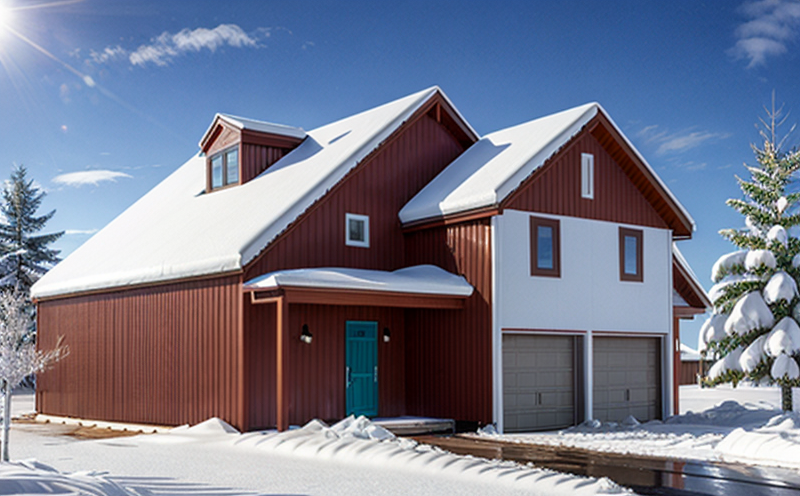Ensuring that materials used in building envelopes continue to perform in harsh weather without failure
Ensuring Materials Performance in Harsh Weather A Crucial Service for Building Envelopes
As the world grapples with the challenges of climate change and environmental sustainability, the importance of building envelopes that can withstand harsh weather conditions has never been more pressing. A well-designed building envelope is crucial to maintaining a comfortable indoor environment while reducing energy consumption and minimizing damage from extreme weather events. However, even the most robust materials can fail if they are not properly tested and validated for performance in demanding weather conditions.
This is where Eurolab comes in our company specializes in providing laboratory services that ensure materials used in building envelopes continue to perform optimally in harsh weather without failure. In this article, we will delve into the significance of ensuring material performance in building envelopes, the benefits of using our laboratory services, and answer some frequently asked questions about our expertise.
What is Ensuring Material Performance in Building Envelopes?
Ensuring material performance in building envelopes refers to the process of testing and validating the ability of materials used in building construction to withstand various weather conditions, including extreme temperatures, precipitation, wind, and sunlight. This involves subjecting materials to simulated weather conditions in a laboratory setting, using advanced equipment and methodologies to accurately assess their performance.
The Importance of Ensuring Material Performance
There are several reasons why ensuring material performance in building envelopes is essential for businesses
Reduced Maintenance Costs By testing materials in controlled laboratory settings, we can identify potential issues before they become costly problems on-site.
Improved Energy Efficiency Materials that perform optimally in harsh weather conditions reduce energy consumption and minimize the need for maintenance.
Enhanced Durability Our services ensure that building envelopes can withstand extreme weather events, reducing the risk of damage and associated costs.
Increased Safety By identifying potential risks early on, we help prevent accidents and ensure a safe working environment.
Advantages of Using Eurolabs Laboratory Services
Our laboratory services offer numerous benefits to businesses looking to ensure material performance in building envelopes
Comprehensive Testing Methods Our expert team uses state-of-the-art equipment and methodologies to simulate various weather conditions, providing accurate assessments of material performance.
Customized Solutions We work closely with clients to understand their specific needs and provide tailored solutions that meet their requirements.
Time-Saving By identifying potential issues early on, we save our clients time and resources in the long run.
Cost-Effective Our services help prevent costly maintenance, repairs, and replacements down the line.
Key Benefits of Using Eurolabs Services
Here are some key benefits of using Eurolabs laboratory services
Extended Material Lifespan
Improved Energy Efficiency
Enhanced Durability
Increased Safety
Reduced Maintenance Costs
Comprehensive Testing Methods
Customized Solutions
Frequently Asked Questions
Here are some frequently asked questions about our laboratory services
What types of materials can be tested?
We test a wide range of materials used in building envelopes, including roofing membranes, insulation, windows, and doors.
How do you simulate weather conditions in the laboratory?
Our expert team uses advanced equipment and methodologies to simulate various weather conditions, including temperature fluctuations, precipitation, wind, and sunlight.
What is the turnaround time for testing and reporting results?
We strive to provide quick turnaround times, typically within a few days of completing testing.
Can you provide customized solutions for specific building envelopes?
Yes, we work closely with clients to understand their unique needs and provide tailored solutions that meet their requirements.
Conclusion
Ensuring material performance in building envelopes is essential for businesses looking to maintain a comfortable indoor environment while reducing energy consumption and minimizing damage from extreme weather events. Our laboratory services at Eurolab provide comprehensive testing methods, customized solutions, time-saving benefits, and cost-effective results. By working with us, you can rest assured that your materials will continue to perform optimally in harsh weather conditions without failure.
Contact us today to learn more about our laboratory services and how we can help ensure the performance of your building envelope materials.
-
Testing the ability of materials to withstand prolonged exposure to environmental elements
-
Simulating long-term exposure to UV light, rain, wind, and temperature fluctuations
-
Evaluating how building materials such as paints, coatings, and sealants hold up under harsh weather
-
Testing for color fading, material cracking, or degradation caused by environmental exposure
-
Ensuring that materials maintain their structural integrity and appearance over time
-
Simulating extreme weather conditions to test how materials react to rapid changes in climate
-
Verifying the durability of construction materials in areas prone to extreme weather patterns
-
Ensuring that exterior materials, including roofing and cladding, remain stable under exposure to the sun
-
Testing the ability of materials to resist the effects of saltwater and humidity in coastal regions
-
Verifying that materials used for outdoor applications are resistant to UV degradation and weathering
-
Simulating the effects of freeze-thaw cycles on construction materials and coatings
-
Evaluating the impact of pollutants in the air on materials used in urban environments
-
Testing how materials respond to repeated exposure to high temperatures and cold snaps
-
Verifying that materials used in construction do not lose their mechanical strength over time
-
Testing the impact of ozone exposure on rubber, plastics, and other vulnerable materials
-
Ensuring that weathered materials retain their original properties and do not compromise building safety
-
Simulating rain, snow, and high winds to determine how materials respond to these forces
-
Testing for the resistance of materials to discoloration or surface damage after extended weather exposure
-
Evaluating the protection provided by weather-resistant coatings in long-term outdoor environments
-
Testing for resistance to ice formation and the potential for materials to crack or deform
-
Ensuring that materials are capable of withstanding the test of time in outdoor, high-traffic environments




